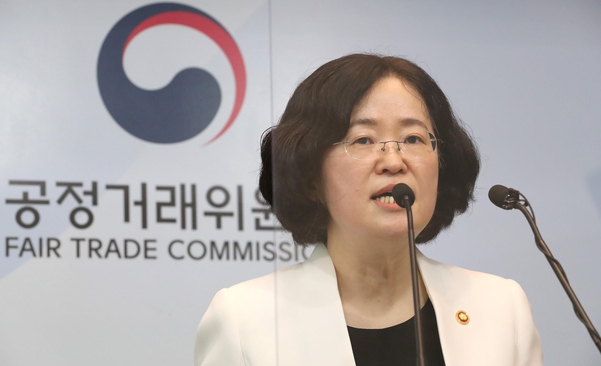Input 2020.12.28 12:00
Ordered to sell 100% of’DH Korea’ to take over Baemin
Yogiyoe ordered to maintain the status quo… “No change in commission rate”
The Fair Trade Commission gave conditional approval to German Delivery Hero (DH), which is pursuing the acquisition of Bae-Min-jok (Bae-min), saying,’Sell Yogiyo when taking over Bae-Dal’s People’. In November, after reviewing the FTC’s review report, DH said, “I disagree with the FTC’s decision. I will appeal to the members of the plenary meeting”, but the FTC’s decision has not changed.
The FTC announced on the 28th that DH has decided to conditionally approve a business combination acquiring about 88% of Baemin’s elegant brothers. The combination condition is to sell 100% of DH’s stake in’DH Korea’ to a third party within 6 months. However, if the inevitable circumstances that could not be sold are acknowledged, an extension can be requested within the range of 6 months.

According to the Fair Trade Commission, the total share of DH-baemin reaches 99.2% based on the transaction amount in 2019. Other companies, such as ordering Kakao and Wemakepo, account for only 0.8%. Accordingly, the FTC predicted that if DH and Baemin merged, they would become market dominant.

When DH-Baemin merges in the delivery app market, it meets the requirements for estimating competition restrictions in indicators such as transaction price, restaurant fees, and number of consumers. According to Article 7 (4) of the Fair Trade Act, if the market share gap between the first place and the second place is more than 50%, the market share gap between the first and second place is more than 25% of their share, the competition limiting estimation requirements are satisfied.
For DH-Baemin, not only the transaction price (99.2%), but also the share based on commission sales (99.3%), the share based on monthly net users (89.6%), and the number of downloads (98.2%) are subject to competition restrictions.
The FTC judged that Coupang Itz’ market share has recently been increasing mainly in parts of Seoul, but it is difficult to see it as DH-Baemin’s competitive pressure because its market share is less than 5% based on the national market, which is a related market. Competitive pressure refers to the force that leads to the development of new technologies and price reduction by establishing a competitive relationship in a certain transaction field.
In addition, the Fair Trade Commission said that as users of Bae Min and Yogiyo choose each other as the second best, there is a high possibility of mutual demand substitution and conversion. This means, for example, that Baemin often uses Yogiyo when there is no restaurant he prefers. In the end, the merged company can take both orders.
According to a survey by the FTC, about 90% of multi-hoing users who use various delivery apps use Baemin and Yogiyo. In terms of restaurants, Baemin, which has the highest number of orders, was primarily used, and secondarily, there were many cases of redundant services even in Yogiyo.
The FTC believes that due to the merger of DH and Baemin, competition disappears, and there is a concern that anti-competition behaviors such as decreased consumer benefits and increased restaurant fees may occur. If the influential competitor who competed for discount promotion disappears, coupon discount promotion for consumers may decrease. In fact, the FTC confirmed that Bae Min and Yogi Yoga provided less coupon discounts per order in regions with a higher market share than their counterparts.
In addition, there is a possibility that the competition for discounting fees for attracting restaurants will be reduced or the fees for existing restaurants may increase. According to the FTC’s simulation, even if DH-Baemin raises the commission, the churn rate of restaurants in store is less than 1%. That’s why restaurants are highly dependent on the two delivery apps, so they have no choice but to use them even if they raise fees.
In addition, the FTC viewed DH-Baemin’s share of about 20% in the entire food delivery agency market, including offline. However, if the merged company gives preferential treatment to restaurants that use its own delivery agency service for the purpose of controlling the delivery agency market as well as delivery apps, it is believed that the competitiveness of existing delivery agencies could be undermined.

The Fair Trade Commission ordered not only the sale of the stake, but also behavioral measures such as maintaining the status quo until the sale is completed. This is a measure to prevent a decline in competitiveness, such as the quality of Yogiyo services that are subject to sale. Behavioral measures include ▲ prohibition of changing the actual fee rate ▲ prohibition of use and discrimination of promotions over the same month of the previous year ▲ prohibition of forced or incentives to switch to affiliated delivery apps ▲ prohibition of adverse changes and induction of working conditions of delivery personnel ▲ prohibition of transfer and sharing of information assets.
If the DH side disagrees with the results of the Fair Trade Commission, an objection can be filed within 30 days of receiving the notice of disposition. In this regard, the FTC must reconsider within 60 days. However, if the results do not change, DH will have to legally quarrel with the FTC through an administrative lawsuit.
An official from the FTC said, “(If a conditional merger is concluded), we will maintain a competitive relationship between Baemin and Yogiyo to promote consumer welfare in the delivery app-related market and to maintain the basis for promoting mutual innovation competition.” “We will be able to achieve synergy effects through cooperation between the two companies, such as combining DH’s technology and Baemin’s marketing capabilities while allowing the union between Bae Min.”
Meanwhile, the number of monthly users of the delivery app (based on access) was 27 million as of August. The number of restaurants using the delivery app was about 350,000, and the number of delivery agency riders was about 120,000.
